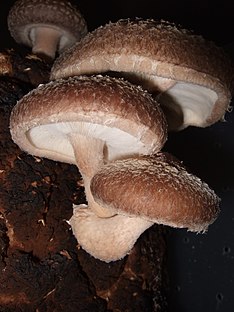Shiitake
| Shiitake | |
|---|---|
 |
|
| Scientific classification | |
| Kingdom: | Fungi |
| Division: | Basidiomycota |
| Class: | Agaricomycetes |
| Order: | Agaricales |
| Family: | Marasmiaceae |
| Genus: | Lentinula |
| Species: | L. edodes |
| Binomial name | |
|
Lentinula edodes (Berk.) Pegler (1976) |
|
| Lentinula edodes | |
|---|---|
| Mycological characteristics | |
| gills on hymenium | |
| cap is convex | |
| hymenium is free | |
| stipe is bare | |
|
|
spore print is white to buff |
| ecology is saprotrophic | |
| edibility: choice | |
| Shiitake | |||||||
| Chinese name | |||||||
|---|---|---|---|---|---|---|---|
| Traditional Chinese | 香菇 | ||||||
| Simplified Chinese | 香菇 | ||||||
| Hanyu Pinyin | xiānggū | ||||||
|
|||||||
| Vietnamese name | |||||||
| Vietnamese | |||||||
| Thai name | |||||||
| Thai | (hèt hŏm) | ||||||
| Korean name | |||||||
| Hangul | 표고 | ||||||
| Hanja | 瓢菰 | ||||||
|
|||||||
| Japanese name | |||||||
| Kanji | 椎茸 | ||||||
| Hiragana | しいたけ | ||||||
| Transcriptions | |
|---|---|
| Standard Mandarin | |
| Hanyu Pinyin | xiānggū |
| Transcriptions | |
|---|---|
| Revised Romanization | pyogo |
| Nutritional value per 100 g (3.5 oz) | |
|---|---|
| Energy | 141 kJ (34 kcal) |
|
6.8 g
|
|
| Sugars | 2.4 g |
| Dietary fiber | 2.5 g |
|
0.5 g
|
|
|
2.2 g
|
|
| Vitamins | |
| Thiamine (B1) |
(2%)
0.02 mg |
| Riboflavin (B2) |
(18%)
0.22 mg |
| Niacin (B3) |
(26%)
3.88 mg |
| Pantothenic acid (B5) |
(30%)
1.5 mg |
| Vitamin B6 |
(22%)
0.29 mg |
| Folate (B9) |
(3%)
13 μg |
| Vitamin C |
(4%)
3.5 mg |
| Vitamin D |
(3%)
0.4 μg |
| Minerals | |
| Calcium |
(0%)
2 mg |
| Iron |
(3%)
0.4 mg |
| Magnesium |
(6%)
20 mg |
| Manganese |
(10%)
0.2 mg |
| Phosphorus |
(16%)
112 mg |
| Potassium |
(6%)
304 mg |
| Sodium |
(1%)
9 mg |
| Zinc |
(11%)
1.0 mg |
| Other constituents | |
| Water | 89.7 g |
| Selenium | 5.7 ug |
|
|
|
|
|
| Percentages are roughly approximated using US recommendations for adults. Source: USDA Nutrient Database |
|
| Nutritional value per 100 g (3.5 oz) | |
|---|---|
| Energy | 1,238 kJ (296 kcal) |
|
75.37 g
|
|
| Sugars | 2.21 g |
| Dietary fiber | 11.5 g |
|
0.99 g
|
|
|
9.58 g
|
|
| Vitamins | |
| Thiamine (B1) |
(26%)
0.3 mg |
| Riboflavin (B2) |
(106%)
1.27 mg |
| Niacin (B3) |
(94%)
14.1 mg |
| Pantothenic acid (B5) |
(438%)
21.879 mg |
| Vitamin B6 |
(74%)
0.965 mg |
| Folate (B9) |
(41%)
163 μg |
| Vitamin C |
(4%)
3.5 mg |
| Vitamin D |
(26%)
3.9 μg |
| Minerals | |
| Calcium |
(1%)
11 mg |
| Iron |
(13%)
1.72 mg |
| Magnesium |
(37%)
132 mg |
| Manganese |
(56%)
1.176 mg |
| Phosphorus |
(42%)
294 mg |
| Potassium |
(33%)
1534 mg |
| Sodium |
(1%)
13 mg |
| Zinc |
(81%)
7.66 mg |
| Other constituents | |
| Water | 9.5 g |
| Selenium | 46 ug |
|
|
|
|
|
| Percentages are roughly approximated using US recommendations for adults. Source: USDA Nutrient Database |
|
spore print is white
The shiitake (![]() listen Lentinula edodes) is an edible mushroom native to East Asia, which is cultivated and consumed in many Asian countries. It is considered a medicinal mushroom in some forms of traditional medicine.
listen Lentinula edodes) is an edible mushroom native to East Asia, which is cultivated and consumed in many Asian countries. It is considered a medicinal mushroom in some forms of traditional medicine.
The fungus was first described scientifically as Agaricus edodes by Miles Joseph Berkeley in 1877. It was placed in the genus Lentinula by David Pegler in 1976. The fungus has acquired an extensive synonymy in its taxonomic history:
The mushroom's Japanese name shiitake (?) is composed of shii (椎 shī?, Castanopsis), for the tree Castanopsis cuspidata that provides the dead logs on which it is typically cultivated, and take (茸?, "mushroom"). The specific epithet edodes is the Latin word for "edible".
...
Wikipedia
